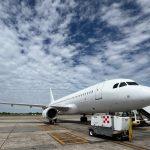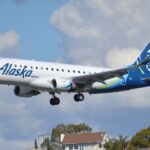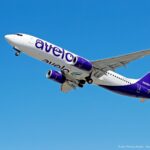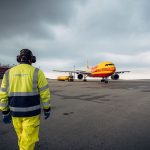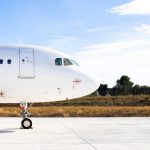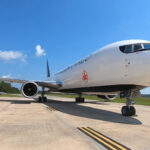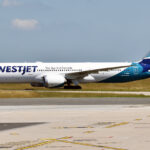New Indian low-cost carrier Akasa Air began its scheduled commercial operations yesterday, August 7th. The airline’s inaugural flight, marketed as QP1101, took off from Mumbai’s Chhatrapati Shivaji International Airport (BOM) at 10:34 and arrived at Ahmedabad’s Sardar Vallabhbhai Patel International Airport (AMD) at 11:23 local time.
The operation was performed with the Boeing 737 MAX-8 with registration VT-YAA, the first aircraft to join Akasa Air’s fleet. Inauguration of services had been postponed twice due to delays in deliveries. The first aircraft arrived in New Delhi at the end of June.
«Today marks a significant milestone in Akasa Air’s journey as we successfully commence our commercial operations with our maiden flight from Mumbai to Ahmedabad», said Vinay Dube, founder and CEO of the company. «This is not just a testament to the women and men of Akasa that have made this day possible, but also a testament of India’s ongoing economic transformation and that of the country’s rapidly progressing civil aviation landscape», he added.
On the other hand, the executive highlighted the company’s focus «delivering a flying experience unlike anything witnessed in the Indian skies thus far» and assured that Akasa Air will seek to «support the economic progress» of the country from building a «green, dependable and affordable» airline.
Glimpses of the big day, when Akasa took off from Ahmedabad to Mumbai for the first time! ✈️#OurFirstAkasa pic.twitter.com/6SvAYNxNwb
— Akasa Air (@AkasaAir) August 8, 2022
More destinations and fleet expansion
The company plans to add destinations and connections to its network progressively. Initially, it will offer a total of five routes and operate to five cities: Mumbai, Bangalore, Chennai, Ahmedabad and Kochi. Its expansion plan envisages achieving a strong presence throughout the country.
To this end, Akasa Air will continue to increase the size of its fleet: it plans to have 18 aircraft in operation by March 2023 and to receive up to 54 in the next four years. The company ordered a total of 72 aircraft. Backlog included 737 MAX-8 aircraft and 737-8200, the high-density and high-capacity version of the 737 MAX.
The commitment to the latest type of Boeing’s popular single-aisle family of aircraft considered its cost per seat and per mile in the operational context of the Indian market, one of the most dynamic and fastest-growing in the world.



